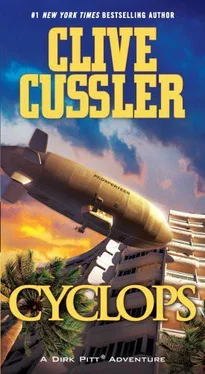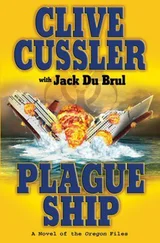Pitt's first goal was to find his friends and plan an escape, but twenty yards down the corridor he discovered a narrow, circular emergency shaft with a ladder that led upward into darkness. He decided to see where it went. The climb seemed endless and he realized it was taking him past the upper levels of the underground facility. At last his groping hands touched a wooden cover above his head. He leaned his upper back against it and slowly applied pressure. The cover creaked loudly as it lifted.
Pitt sucked in his breath and froze. Five minutes came and went and nothing happened, nobody shouted, and when he finally eased the cover high enough, he found himself looking out across the concrete floor of a garage containing several military and construction vehicles. The structure was large, eighty by a hundred feet and perhaps fifteen feet to a ceiling supported by row of steel girders. The parking area was dark, but there was an office at one end whose interior was brightly lit. Two Russians in Army fatigues were sitting at a table playing chess.
Pitt snaked from the exit shaft, skirted behind the parked vehicles, and crawled under the windows of the office until he reached the main entry door. Coming this far from his cell was surprisingly easy but now defeat had arrived where he least expected it. The door was electric. There was no way he could activate it without alerting the chess players.
Staying in the shadows, he moved along the walls searching for another entrance. In his mind he knew it was a lost cause. If this building was on the surface it was probably another covered mound with the large vehicle entry door as the only means of getting in and out.
He made a complete circuit of the walls and returned to the spot where he started. Disheartened, he was about to give up when he looked upward and spotted an air vent mounted on the roof. It appeared large enough to squeeze through.
Pitt quietly climbed on top of a truck, reached over his head, and pulled himself onto a support girder. Then he inched his way about thirty feet to the vent and squirmed his way to the outside. The rush of fresh, humid air felt invigorating. He guessed that the dying wind of the hurricane was only blowing at about twenty miles an hour. The sky was only partially overcast and there was a quarter moon that provided enough visibility to vaguely make out objects within a hundred feet.
His next problem was to get beyond the high wall enclosing the compound. The guardhouse by the gate was manned, so there would be no repeat of his entry two nights ago.
In the end, luck came to his aid once again. He walked along a small drainage culvert that passed under the wall. He ducked under but was brought up short by a row of iron bars. Fortunately they were badly rusted from the tropical salt air and he easily bent them apart.
Three minutes later Pitt was well clear of the installation, jogging through the palm trees lining the sunken road. There were no signs of guards or electronic surveillance cameras and the low shrubs helped conceal his silhouette against the light-colored sand. He ran at an angle toward the beach until he was up against the electrified fence.
Eventually, he came to the section damaged by the hurricane. It had been repaired, but he knew it was the correct spot because the fallen palm tree that had caused the break was lying nearby. He dropped to his knees and began scooping the sand from under the fence. The deeper he dug the more the walls of his trench kept sliding and filling in the bottom. Nearly an hour passed before he formed a crater deep enough for him to wiggle on his back through to the other side.
His shoulder and kidney ached and he was sweating like a soaked sponge. He tried to retrace his steps to the landing site by the rocks on the beach. None of the landscape seemed the same under the dim light of the moon, not that he could recall how it looked when beaten flat by hurricane winds and with his eyes mostly closed.
Pitt wandered up and down the beach, probing between the rock formations. He was almost ready to give up and quit when his eye caught the moon's glint on an object in the sand. His hands reached out and touched the fuel tank of the inflatable boat's outboard motor. The shaft and propeller were buried in the sand about thirty feet from the high-tide line. He dug away the damp sand until he could pull the motor free. Then he hoisted it over his shoulder and began walking down the beach away from the Russian compound.
Pitt had no idea where he was going or where he was going to hide the motor. His feet dug into the sand and the burden of sixty pounds made it tough going. He had to stop every few hundred yards and rest.
He had walked about two miles when he met a weed-covered road that passed through several rows of deserted and decaying houses. Most of them were little more than shacks and they nestled around a small lagoon. It must have once been a fishing village, Pitt thought. He could not know it was one of the settlements whose residents had been forcefully uprooted to the mainland during the Soviet takeover.
He gratefully shrugged off the motor and began rummaging in the houses. The walls and roofing were made from corrugated iron sheets and scrap wood. Little of the furnishings remained. He found a boat pulled up on the beach, but any hope of using it was crushed. The bottom was rotted away.
Pitt considered building a raft, but it would take too long, and he couldn't run the risk of putting together something under the double handicap of working in darkness with no tools. The end result would not offer much peace of mind in rough water.
The luminous dial on his watch read 1:30. If he wanted to find and talk to Giordino and Gunn, he'd have to get a move on. He wondered what to do about fuel for the outboard motor, but there was no time to search now. He calculated it would take him a good hour to regain his cell.
He found an old cast-iron bathtub lying outside a collapsed shed. He placed the outboard motor on the ground and turned the tub upside down over it. Then he threw some tires and a rotting mattress on top and walked backward, brushing sand over his footprints with a palm frond until he stood a good seventy-five feet away.
Sneaking back in went more smoothly than sneaking out. All he had to remember was to restraighten the bars in the culvert. Belatedly, he wondered why the island compound wasn't crawling with security guards, but then it came to him that the area was constantly overflown by American spy planes whose cameras had the uncanny ability to produce photographs that could read the name on a golf ball from ninety thousand feet.
The Soviets must have figured it was better to trade heavy security for the appearance of a lifeless, abandoned island. Cuban dissidents fleeing Castro's government would ignore it and any Cuban exile commandos would certainly bypass it for the mainland. With no one landing and no one escaping, the Russians had nothing to guard against.
Pitt dropped through the air ventilator and stealthily made his way back across the garage and down the exit shaft. The corridor was still quiet. He checked his door and saw the hair was still in place.
His plan now was to find Gunn and Giordino. But he didn't want to crowd his luck. Although their imprisonment was lax, there was always the problem of a chance discovery. If Pitt was caught outside his cell now, it would spell the end. Velikov and Gly were sure to keep him tightly locked away if they didn't outright execute him.
He felt he had to risk it. There might not be another opportunity. Any sound echoed throughout the concrete corridor. He would be able to hear footsteps in plenty of time to regain his cell if he didn't probe too far.
The room next to his was a paint locker. He searched it for a few minutes but found nothing useful. Two rooms across the corridor were empty. The third held plumbing supplies. Then he unlatched another door and found himself staring into the surprised faces of Gunn and Giordino. He quickly slipped inside, careful to keep the door's bolt from engaging.
Читать дальше












